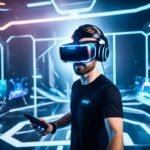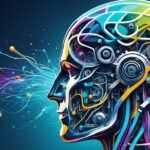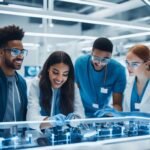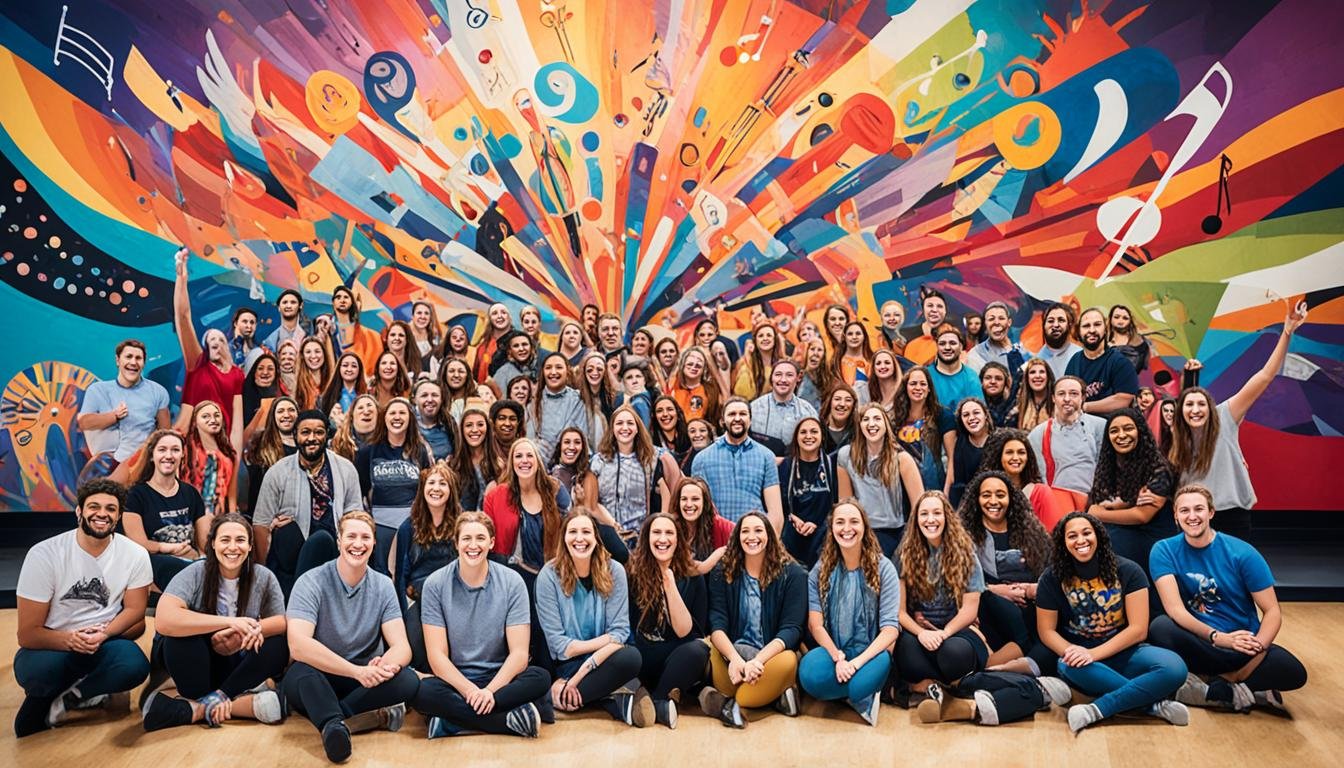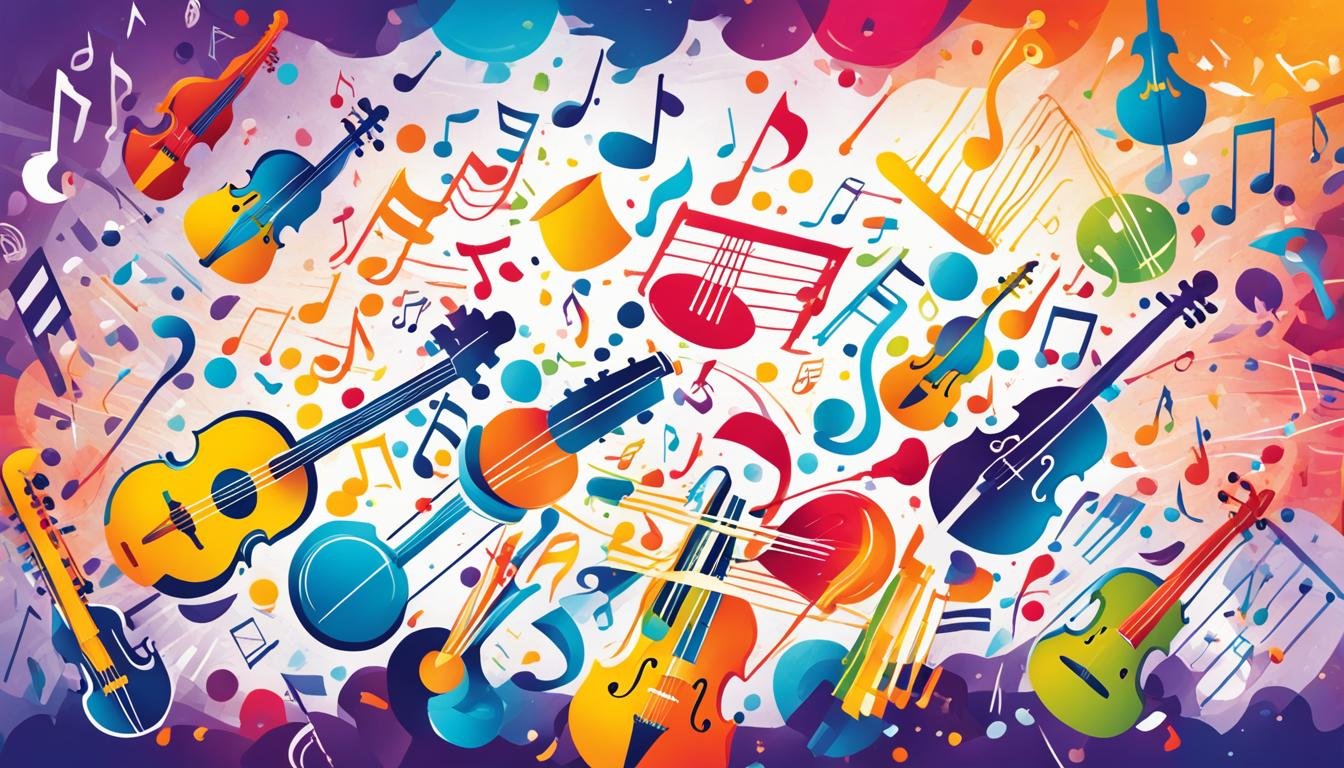Welcome to a world of endless possibilities and boundless imagination. In this article, I will take you on a journey into the captivating realm of arts and music education, where innovative teaching methods and expressive learning opportunities collide to nurture creativity and unlock hidden talents.
Music and arts learning excellence programs have long been recognized as transformative avenues for personal growth and self-expression. From music education programs that cultivate talent to art classes for adults that offer a new horizon in personal development, the power of artistic expression knows no bounds. With the advent of online music lessons, individuals can now embark on their musical journey from the comfort of their own homes, opening doors to learning like never before.
Artistic development workshops and music theory tutorials delve deep into the intricacies of the creative process, providing aspiring artists and musicians with the tools they need to flourish. Meanwhile, creative expression courses and visual arts instruction provide a canvas for individuals to explore their unique perspectives and unleash their potential. Performing arts classes bring together a dynamic group of learners, fostering collaboration and community as students embark on a shared creative journey.
An essential component of any well-rounded education, arts curriculum crafts comprehensive creative learning pathways that integrate expressive arts seamlessly into the fabric of education. By fusing traditional art techniques with contemporary learning methods, visual arts programs embrace the canvas of modern education, preparing students for a world where innovation and self-expression reign supreme.
As we dive deeper into the intricacies of music theory tutorials and the mentorship programs that bridge the gap between experienced educators and aspiring students, we begin to uncover the layers of dedication and passion that permeate the world of music education. Through community partnerships and financial solutions, we strive to make music workshops and accessibility a reality for all, ensuring that no talent goes undiscovered.
In this harmonious symphony of art and music education, we witness the transformative impact it has on creativity, personal growth, and overall well-being. Together, let us celebrate the enigmatic power of the arts, embracing their ability to shape future creatives and ignite a passion within us all.
Key Takeaways:
- Arts and music education foster creativity and personal growth.
- Online music lessons provide accessibility to individuals of all backgrounds.
- Artistic development workshops and music theory tutorials enhance artistic skills.
- Expressive learning opportunities unleash potential and passion.
- Visual arts programs and curriculum embrace innovative teaching methods.
Embracing the Power of Music and Arts in Personal Growth
In this section, let’s explore the incredible impact of music and arts education on personal growth. Engaging in music and art can have profound effects on creativity, self-expression, and emotional development.
Music education plays a vital role in building a strong foundation for personal growth. Learning to play an instrument or sing not only nurtures musical talent but also enhances cognitive skills, discipline, and perseverance. It provides an avenue for self-expression and allows individuals to explore their emotions through musical performance.
Similarly, art education is essential for fostering creativity and self-expression. Through various art forms such as painting, drawing, and sculpting, individuals can unlock their imagination and develop their artistic skills. Art education encourages critical thinking, problem-solving, and the ability to see the world from different perspectives.
Engaging in music and art allows individuals to tap into their innermost thoughts and emotions, providing a means of self-expression that might otherwise remain hidden. It promotes a sense of self-confidence and empowerment, allowing individuals to discover and celebrate their unique voice.
Moreover, music and art education contribute to overall well-being. Research shows that participating in music and art activities reduces stress, anxiety, and depression, while also improving cognitive function and boosting mood. It provides individuals with a means of escape, relaxation, and self-care.
By embracing the power of music and arts, individuals can embark on a journey of personal growth, self-discovery, and fulfillment. Whether it’s through playing an instrument, creating a masterpiece, or attending a live performance, music and art have the incredible ability to enrich our lives and connect us to our inner selves.
The Essential Role of Art Classes in Nurturing Creative Minds
Art Classes for Adults: A New Horizon in Personal Development
Art classes are not just for children; they also offer a new horizon in personal development for adults. Engaging in art classes for adults allows individuals to tap into their creativity, explore new artistic mediums, and develop their artistic skills. Whether it’s painting, sculpting, drawing, or mixed media, these classes provide a supportive and nurturing environment for adults to express themselves artistically.
Revitalizing Education with Artistic Development Workshops
Artistic development workshops play a vital role in revitalizing education by fostering creativity and innovation. These workshops provide a space for individuals to experiment, learn new techniques, and refine their artistic abilities. Through hands-on activities, guided instruction, and collaboration with fellow artists, participants can expand their artistic horizons and push the boundaries of their creativity.

Artistic development workshops offer a unique opportunity to receive personalized feedback and guidance from experienced artists and instructors. This feedback helps participants further develop their artistic skills and refine their artistic style. Whether you are a beginner looking to explore your artistic potential or an experienced artist seeking to enhance your craft, these workshops provide a supportive and enriching environment for creative growth.
| Benefits of Art Classes for Adults | Importance of Artistic Development Workshops |
|---|---|
|
|
Music and Arts Learning Excellence: Shaping Future Creatives
In the realm of arts and music education, the pursuit of excellence is paramount. By nurturing talent and providing comprehensive training, music education programs play a crucial role in shaping future creatives. These programs are designed to cultivate artistic abilities, foster creativity, and empower students to pursue their passions.
Fostering Talent Through Music Education Programs
Music education programs offer a structured and holistic approach to talent development. These programs provide students with the opportunity to learn and refine their musical skills under the guidance of experienced educators. By incorporating a comprehensive curriculum that includes music theory, instrumental proficiency, ensemble performance, and composition, these programs lay a strong foundation for artistic growth and expression.
The benefits of music education programs extend beyond the acquisition of technical skills. Students also gain valuable experiences in collaboration, discipline, perseverance, and self-expression. These programs create an environment where students can explore their musical interests, experiment with different genres and styles, and discover their unique artistic voice.
Furthermore, music education programs offer performance opportunities that allow students to showcase their talents and build confidence. Whether it’s a recital, concert, or competition, these experiences contribute to the holistic development of young musicians and prepare them for future success in the music industry.
Innovative Teaching Methods in Visual Arts Instruction
Visual arts instruction goes beyond traditional techniques and embraces innovative teaching methods to inspire creativity and ignite imagination. Educators utilize a variety of approaches that encourage students to explore different mediums, experiment with unconventional materials, and think outside the box.
One such method is project-based learning, where students are given the opportunity to work on interdisciplinary projects that integrate visual arts with other subjects such as science, history, or literature. This approach promotes critical thinking, problem-solving, and cross-disciplinary connections, enriching the learning experience and fostering a deeper understanding of the artistic process.
Another innovative teaching method is collaborative art-making. This approach encourages students to work together, share ideas, and create artwork collectively. Collaborative projects not only facilitate teamwork and communication skills but also promote a sense of community and belonging in the art classroom.
Additionally, technology has revolutionized visual arts instruction, providing students with new tools and mediums for artistic expression. From digital art programs to 3D modeling software, technology offers limitless possibilities for creativity and artistic exploration.
Visual arts instruction fosters individuality, self-expression, and a deep appreciation for art. By incorporating innovative teaching methods, educators empower students to embrace their creativity, think critically, and develop a lifelong passion for the visual arts.
| Benefits of Music Education Programs | Innovative Teaching Methods in Visual Arts Instruction |
|---|---|
|
|
Decoding the Symphony: Online Music Lessons and Their Impact
In today’s digital age, the world of music education has embraced the power of virtual learning. Online music lessons have revolutionized the way individuals learn and engage with musical training. Through the utilization of technology, students can now access high-quality music education from the comfort of their own homes, opening up a world of possibilities for aspiring musicians of all ages and backgrounds.
One of the key advantages of online music lessons is the accessibility they provide. Regardless of geographical location or logistical constraints, students can now connect with renowned music instructors from around the world. This enables students in remote areas or those with busy schedules to pursue their passion for music without any limitations. The virtual learning environment also eliminates the need for students to commute to physical music schools, saving both time and resources.

Technology plays a significant role in the delivery of effective online music lessons. With video conferencing tools and learning management systems, instructors can provide personalized instruction, feedback, and guidance to their students. The use of interactive platforms allows for real-time engagement, ensuring a dynamic and immersive learning experience. Students can access a wide range of resources, including sheet music, practice exercises, and recorded lessons, enhancing their musical development.
Furthermore, online music lessons foster a sense of independence and self-discipline in students. Remote learning requires individuals to take ownership of their education and practice diligently in a self-directed manner. This cultivates valuable skills such as time management, goal setting, and perseverance – qualities that are not only essential in music but also transferable to other areas of life.
Despite the virtual nature of online music lessons, the sense of community and camaraderie is not lost. Many online platforms offer forums, discussion boards, and virtual performance opportunities, allowing students to connect with peers, share experiences, and collaborate on musical projects. These virtual communities create a supportive learning environment, fostering creativity and inspiration.
As technology continues to evolve, the world of music education is evolving with it. Online music lessons provide students with greater flexibility, accessibility, and a vast pool of resources and expertise to tap into. They have truly democratized musical training, making it available to individuals from diverse backgrounds. Whether you’re a budding musician or someone looking to enhance your musical skills, online music lessons offer a wealth of opportunities to explore and grow in the world of music.
The Dynamics of Group Learning in Performing Arts Classes
In performing arts classes, the dynamics of group learning play a vital role in shaping the growth and development of aspiring artists. By engaging in collaborative activities and projects, students not only acquire valuable skills but also create a sense of community and belonging within the performing arts realm.
Performing Arts Training: A Collaborative Approach
Performing arts training is inherently rooted in collaboration. Students come together to learn and practice various disciplines, including theater, dance, music, and more. Through group exercises, rehearsals, and performances, they enhance their skills while also cultivating important attributes such as teamwork, communication, and adaptability.
Collaborative activities in performing arts classes encourage students to work together towards a common goal. They learn to respect and appreciate diverse perspectives, fostering an environment that nurtures creativity and innovation. Through collaboration, aspiring artists gain a deeper understanding of their craft and develop the ability to collaborate effectively with others, skills that are valuable not only within the performing arts but also in various other facets of life.
In addition to the development of interpersonal skills, a collaborative approach to performing arts training also allows students to learn from one another. They can observe and learn from their peers, gaining inspiration and insights that may enrich their own artistic expressions.
Building a Community in Performing Arts Classes
Building a supportive and inclusive community is an essential aspect of performing arts classes. As students engage in group learning, they form connections with one another based on their shared interests and passions. This sense of community fosters a supportive and encouraging environment where students feel comfortable exploring their artistic potential.
Performing arts classes often provide opportunities for students to work together on creative projects, performances, and showcases. These collaborative endeavors emphasize the importance of teamwork and instill a sense of belonging. Students are encouraged to collaborate, share ideas, support one another, and celebrate collective achievements.
Within this community, students have the opportunity to build friendships, network with peers, and learn from experienced teachers and mentors. They can draw inspiration from the achievements of others, receive constructive feedback, and find support in their creative journey.
Overall, the dynamics of group learning in performing arts classes promote collaboration, communication, and community building. Through collaborative projects and a supportive environment, students develop not only their artistic skills but also invaluable life skills that will benefit them in their future endeavors.
Investing in the Future: The Significance of Arts Curriculum
In today’s ever-evolving educational landscape, the importance of arts curriculum cannot be overstated. Arts education goes beyond just teaching paintbrush strokes or musical notes; it provides students with comprehensive learning pathways that foster creativity, critical thinking, and holistic development. By integrating arts education into the curriculum, educational institutions have the opportunity to shape the future by nurturing the next generation of expressive artists.
Crafting Comprehensive Creative Learning Pathways
Arts curriculum plays a vital role in crafting comprehensive creative learning pathways for students. By incorporating arts into various subjects, such as math, science, and literature, students are encouraged to think outside the box, make connections, and approach problems from unique perspectives. This interdisciplinary approach promotes a deeper understanding of academic concepts and enhances cognitive skills, such as analytical thinking and problem-solving. Creative learning pathways not only stimulate innovation but also empower students to explore their passions and develop a well-rounded skill set.
Expressive Learning Opportunities as Educational Cornerstones
Expressive learning opportunities serve as educational cornerstones in arts curriculum, enabling students to discover and express their unique voices. Through visual arts, music, dance, theater, and other forms of artistic expression, students find a platform to communicate their thoughts, emotions, and experiences. These opportunities encourage self-discovery, self-expression, and emotional intelligence, fostering personal growth and a deeper sense of identity. By engaging in expressive arts, students gain confidence, develop empathy, and learn to appreciate diversity. These skills are invaluable in today’s interconnected and ever-changing world, equipping students with the tools they need to succeed academically, professionally, and personally.
| Benefits of Arts Curriculum | Impact on Students |
|---|---|
| 1. Enhances creativity and critical thinking | 1. Stimulates innovation and problem-solving skills |
| 2. Promotes interdisciplinary learning | 2. Enables a deeper understanding of academic concepts |
| 3. Encourages self-expression and emotional intelligence | 3. Fosters personal growth and self-discovery |
| 4. Develops confidence and empathy | 4. Equips students with essential life and career skills |
| 5. Provides opportunities for collaboration and teamwork | 5. Cultivates social skills and appreciation for diversity |
Behind the Music: The Intricacies of Music Theory Tutorials
In this section, we will uncover the intricacies of music theory tutorials. Music theory is a fundamental aspect of music education, providing students with the theoretical knowledge necessary to understand and analyze musical concepts. By delving into the structure and composition of music, students gain a deeper appreciation for the art form and can apply this knowledge to their own musical creations.
Music theory tutorials play a vital role in developing theoretical knowledge. These tutorials provide students with step-by-step guidance, allowing them to gradually expand their understanding of music theory concepts. From learning basic notation to mastering complex harmonic progressions, music theory tutorials equip students with the tools they need to analyze and interpret music from a theoretical perspective.
One of the key benefits of music theory tutorials is that they enhance students’ ability to communicate and collaborate with other musicians. By understanding the language of music theory, students can effectively communicate their musical ideas and collaborate in ensemble settings. This proficiency in music theory fosters a deeper sense of musicality and allows for more meaningful and expressive performances.
Moreover, music theory tutorials provide a solid foundation for further musical exploration. Whether students aspire to compose their own music, pursue advanced performance techniques, or study music at a higher level, a strong understanding of music theory is essential. It enables students to navigate complex musical pieces, decipher intricate compositions, and develop their own unique musical voice.
Overall, music theory tutorials are a critical component of music education, providing students with the theoretical knowledge necessary to excel in their musical pursuits. By delving into the intricacies of music theory, students can enhance their understanding of music, communicate effectively with other musicians, and embark on a lifelong journey of musical exploration.

Creative Expression Courses: Unleashing Potential and Passion
In the realm of arts education, creative expression courses serve as transformative experiences, helping individuals unleash their potential and passion for creative pursuits. These courses provide a platform for self-discovery, personal growth, and artistic exploration. Through a diverse range of artistic mediums, participants can tap into their unique talents and foster a deeper connection with their creativity.
Unlocking Innovation Through Creative Learning Techniques
Creative expression courses go beyond traditional teaching methods by incorporating innovative and dynamic learning techniques. These courses embrace experiential learning, encouraging students to actively engage with their chosen art form. By immersing themselves in hands-on activities, students can develop their problem-solving skills, critical thinking abilities, and ability to think outside the box. Through these creative learning techniques, individuals are empowered to push boundaries, challenge conventional norms, and unlock their full innovative potential.

Integration of Expressive Arts in Curriculum for Holistic Education
The integration of expressive arts in the curriculum lays the foundation for holistic education, encompassing emotional, social, and cognitive development. Creative expression courses allow individuals to explore and tap into their emotions, creating a safe space for self-expression and personal reflection. By engaging with expressive arts, individuals can enhance their communication skills, develop empathy, and gain a deeper understanding of themselves and others. This integration of expressive arts in the curriculum ensures a well-rounded education that nurtures creativity, fosters emotional intelligence, and prepares individuals for a fulfilling and purposeful life.
Visual Arts Programs: The Canvas of Modern Education
In the evolving landscape of education, visual arts programs have emerged as a vital component of modern learning. These programs not only nurture artistic talent but also foster creativity, critical thinking, and self-expression. By providing a platform for students to explore their artistic abilities, visual arts instruction serves as a catalyst for personal and academic growth.
Visual arts programs offer a picture of progressive learning, embracing new techniques and approaches that reflect the contemporary art scene. Through a combination of theoretical knowledge and practical application, students are encouraged to think outside the box and push the boundaries of traditional art forms. These programs equip learners with the skills needed to navigate the ever-changing landscape of the creative industry.
Visual Arts Instruction: A Picture of Progressive Learning
Visual arts instruction goes beyond teaching technical skills. It encompasses a comprehensive approach that encourages students to explore their unique artistic vision and experiment with different mediums. By providing guidance and mentorship, instructors create an environment that fosters creative expression and allows students to develop their artistic voice.
Within visual arts programs, students have the opportunity to break away from traditional conventions and explore contemporary art practices. From digital art to mixed media installations, the curriculum supports experimentation and encourages students to think critically about the role of art in society. This progressive approach to learning enables students to develop a well-rounded artistic education that is relevant to the modern world.
Fusing Traditional Art Techniques with Contemporary Learning
While visual arts programs embrace contemporary approaches, they also recognize the value of traditional art techniques. By merging the past with the present, these programs create a rich and dynamic learning environment. Students are exposed to a wide range of art history and learn from renowned artists who have mastered traditional techniques.
The fusion of traditional art techniques with contemporary learning methods allows students to develop a strong foundation while exploring their own artistic style. By understanding the history and techniques that have shaped the art world, students can build upon this knowledge and create innovative works of art that reflect their individuality.
Visual arts programs in modern education provide students with the necessary tools and resources to thrive in the creative industry. By embracing progressive learning, integrating traditional art techniques, and encouraging self-expression, these programs empower students to become well-rounded artists who can make a meaningful impact in the world of art.
Bridging Notes: The Mentorship Program in Music Education
In the realm of music education, mentorship programs play a vital role in shaping the next generation of talented musicians. These programs act as a bridge between experienced educators and aspiring students, fostering a strong teacher-student relationship that goes beyond traditional classroom instruction.
Mentorship programs in music education provide invaluable guidance and support to young musicians, offering personalized mentorship and direction on their artistic journey. Through one-on-one interactions, mentors can identify each student’s strengths, weaknesses, and areas for growth, tailoring their guidance to individual needs.
A mentor’s expertise and experience can greatly influence a student’s musical development, helping them refine their technique, broaden their repertoire, and navigate the complexities of the music industry. The mentor-student relationship goes beyond mere instruction; it becomes a nurturing partnership that inspires and motivates students to reach their full potential.
Mentorship programs in music education bring a wealth of benefits to both mentors and students. Mentors have the opportunity to share their knowledge and passion for music, fostering a sense of fulfillment and purpose. Students, on the other hand, benefit from the wisdom and insights of experienced professionals, gaining valuable insights into the world of music and enhancing their skills.
Furthermore, mentorship programs create a sense of community within the music education environment. Students can connect with like-minded peers and collaborate on musical projects, cultivating a supportive network of fellow musicians. This sense of camaraderie fosters creativity, encourages collaboration, and inspires students to explore new artistic directions.
With mentorship programs in music education, aspiring musicians are given the guidance, support, and inspiration they need to succeed in their musical endeavors. These programs not only enhance technical skills but also foster a deep love and appreciation for music and the arts. By bridging the gap between experienced mentors and eager students, mentorship programs provide a solid foundation for the future of music education.
Navigating the Economics of Music Workshops and Accessibility
In this section, I will discuss the economics of music workshops and their accessibility. Music workshops provide valuable learning and growth opportunities for aspiring musicians, but it is essential to consider the financial aspects to ensure their sustainability and inclusivity.
Community Partnerships and Supportive Sponsors in Music Education
Community partnerships play a vital role in supporting music education programs and making them accessible to a wider audience. By collaborating with local schools, organizations, and businesses, music workshops can secure funding, resources, and venues. These partnerships not only enhance financial support but also foster a sense of community and shared responsibility towards music education.
Supportive sponsors also contribute significantly to the success of music workshops. By sponsoring events, scholarships, or equipment, sponsors help offset costs and provide opportunities for talented individuals who might otherwise face financial barriers. Their support not only enables the growth of music education but also strengthens the community’s commitment to artistic endeavors.
Making Music Accessible: Financial Considerations and Solutions
When striving for music accessibility, it is crucial to address the financial considerations that may hinder participation. Scholarships and financial aid programs can help lower-income individuals access music workshops and education without financial burden. By offering reduced fees or waiving them entirely, organizers can ensure that talented individuals from all socioeconomic backgrounds have the opportunity to pursue their passion for music.
In addition to scholarships, creative financing solutions such as installment plans or sliding-scale fees can make music workshops more affordable and feasible for a broader audience. These options cater to individuals with varying financial situations and enable them to participate in the workshops while alleviating any financial strain.
Moreover, exploring partnerships with government agencies, nonprofits, or grant-funded organizations can provide music workshops with additional financial resources. These entities often offer funding opportunities specifically for arts and educational programs, widening the scope of accessibility and creating more inclusive opportunities for aspiring musicians.
By carefully considering the economics of music workshops and implementing strategies to enhance accessibility, we can ensure that music education remains inclusive and accessible to individuals of all backgrounds and financial means.
Conclusion: The Harmonious Impact of Art and Music Education
In conclusion, the harmonious impact of art and music education cannot be overstated. Both art education and music education play a crucial role in fostering creativity, personal growth, and overall well-being.
Art education provides individuals with a platform to express themselves creatively, allowing them to explore their unique perspectives and ideas. Through artistic endeavors, individuals develop their creative problem-solving skills, resilience, and self-confidence. Art education also encourages critical thinking and deepens cultural understanding, fostering a more inclusive and empathetic society.
Similarly, music education offers numerous benefits for personal growth. Music has the power to transcend language and cultural barriers, allowing individuals to connect with themselves and others on a profound level. Music education enhances cognitive skills, such as memory and concentration, as well as emotional intelligence. Learning to play an instrument or sing in a choir nurtures discipline, perseverance, and teamwork.
To ensure a brighter future for individuals and society as a whole, it is essential to prioritize and invest in art and music education. By providing access to high-quality art and music programs, we empower individuals to unleash their creative potential, foster personal growth, and contribute to the betterment of our world.
